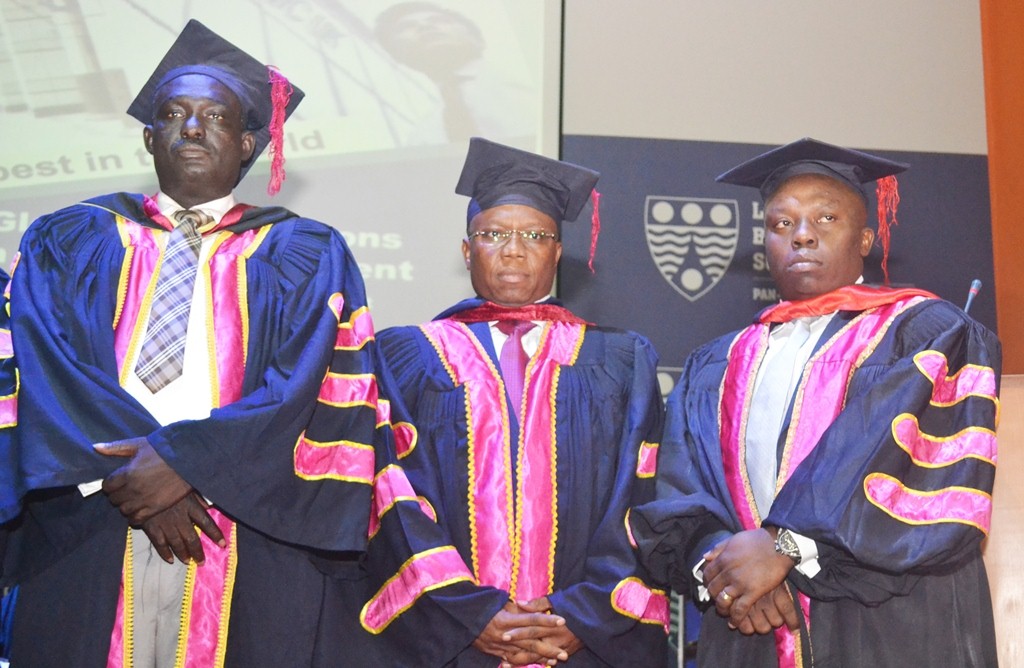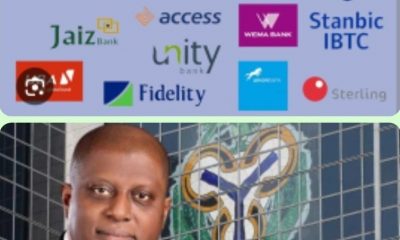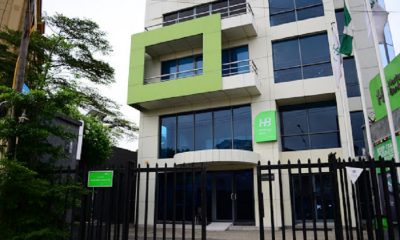Banking
ICA Honours Two Heritage Bank Senior Executives, Others

By Dipo Olowookere
Two senior management executives of Heritage Bank Plc were at the weekend conferred distinguished awards by the Institute of Credit Administration (ICA) at the Nigeria Credit Industry Awards and Postgraduate School of Credit and Financial Management (PSCFM) graduation ceremony.
The awardees were Mr Jude Monye, an executive director of the bank who was awarded Credit Management Director of the Year and Mrs Chinwe Ofulue, Regional Head who was recognised as Credit Relationship Director of the Year.
Besides this, Messrs Obioma Emenike, Group Head, Market Strategy, Heritage Bank; Imomoemi Ibisiki, Group Head, Legal Services, Heritage Bank were inducted as Fellows of ICA, Lilian Oyinlonye Agada, Head, Marketing/Team Lead, Commercial Banking, was inducted as Member, while Blaise Udunze, Media Relationship Officer of the bank, was inducted as an Associate of the institute.
Commenting on the honour bestowed on the team, Mr Monye, who also badged a Ph.D. in Credit Management, expressed gratitude for the recognition of the professional body of their commitment to efficient credit management in Heritage Bank.
According to him, the management at Heritage Bank does and will not go for anything less than premium service delivery for its teeming customers, who cut across different sectors of the aggregate economy.
Mr Monye stated that the quality of banking and financial services that customers of Heritage bank are enjoying is second to none when compared to what is available at any other bank in the country.
He therefore used the opportunity to encourage credit managers in different industries not to look anywhere else beyond Heritage Bank for quality and efficient financial services.
“In fact, what happened here today, is attestation to our professionalism and staff commitment to quality and efficient financial services,” he said.
In a keynote address titled, “Ministerial Review of Credit Management in the oil and gas industry in Nigeria;” the Minister of State for Petroleum Resources, Dr Emmanuel Ibe Kachikwu said the importance of effective credit management goes beyond sectors to business and individuals.
The Minister, who was represented by the Chairman of ICA, Dr Adetunji Oyebanji, remarked that the 2008 financial crisis showed how improper credit management in nation’s housing sector, spilled into individual lives of citizens of multiple countries, adding that the credit management performance of the Nigeria’s oil and gas industry has been noteworthy, with numerous projects in the petroleum value chain attaining completion without incidents of liquidity issues.
Mr Kachikwu said the Federal Government has the responsibility of providing the empowering environment for Nigerian credit sources, adding that the focus areas of Short and Medium-Term Priorities to grow Nigeria’s oil and gas industry (tagged #7 BigWins) ranging from policy and regulation to business environment and investment drive to transparency and efficiency were aimed at providing suitable environment for these credit sources to develop.
He noted that it was imperative that credit providers carry out due diligence on prospective borrowers to minimize any credit defaulting issues that could arise further down the road.
Earlier in his address of welcome, the President of ICA, Dr Oyebanji, said the institute has in collaboration with Postgraduate School of Credit and Financial Management (PSCFM) been in the fore front of endeavours geared towards building an enduring credit management culture in Nigeria through professional and academic development programmes leading to the award of degrees and certificates by accredited foreign universities.
“In driving this vision, PSCFM has built alliances with credible foreign institutions such as the London Postgraduate Credit Management College (LPMC), a renowned ASIC accredited UK credit management institution for the award of foreign degrees up to PhD level in credit management,” Dr Oyebanji said.
He noted that a sound credit management advocacy remained one of the cardinal projects of ICA and called on conglomerates and blue-chip companies in the country to design policies that ensure quick payment of confirmed invoices from small and medium scale enterprises (SMEs).
Banking
The Alternative Bank Opens New Branch in Ondo

By Modupe Gbadeyanka
A new branch of The Alternative Bank (AltBank) has been opened in Ondo State as part of the expansion drive of the financial institution.
A statement from the company disclosed that the new branch would support export-oriented agribusinesses through Letters of Credit and commodity-backed trade finance, ensuring that local producers can scale beyond state borders.
For SMEs, the bank is introducing robust payment rails, asset financing for equipment and inventory, and supply chain-backed facilities that strengthen working capital without trapping businesses in interest-based debt cycles.
The Governor of Ondo State, Mr Lucky Aiyedatiwa, represented by his Chief of
Staff, Mr Olusegun Omojuwa, at the commissioning of the branch, underscored the importance of financial institutions in economic development.
“The pivotal role of financial institutions to economic growth and development of any economy cannot be overemphasised. It provides access to capital, supporting small and medium-scale enterprises and encouraging savings.
“Therefore, I have no doubt in my mind that the presence of The Alternative Bank in Ondo State will deepen financial services, create employment opportunities and stimulate economic activities across various sectors,” he said.
In her remarks, the Executive Director for Commercial and Institutional Banking (Lagos and South West) at The Alternative Bank, Mrs Korede Demola-Adeniyi, commended the state government’s leadership and outlined the lender’s long-term vision for Ondo State.
“As Ondo State steps into its next fifty years, and into the future anchored on the sustainable development championed during the recent anniversary celebrations, The Alternative Bank is here to be the financial engine for that vision. We didn’t come to Akure to hang banners. We came to fund work, farms, shops, and factories.”
With Ondo State’s economy anchored largely on agriculture, particularly cocoa production, poultry farming, and other cash crops, alongside a growing SME and trade ecosystem, AltBank is deploying sector-specific financing solutions tailored to these strengths.
For cocoa aggregators, processors and poultry operators, the bank will provide production financing, facility expansion support, machinery lease structures, and structured trade facilities under its joint venture and cost-plus financing models, with transaction cycles of up to 180 days for commodity trades and longer-term structured asset financing for equipment and infrastructure.
The organisation is a notable national non-interest bank with a physical network now surpassing 170 locations, deploying capital to solve real-world challenges through initiatives such as the Mata Zalla project, which saw to the training of hundreds of women as electric tricycle drivers and mechanics.
Banking
Recapitalisation: 20 Nigerian Banks Now Fully Compliant—Cardoso

By Adedapo Adesanya
The Governor of the Central Bank of Nigeria (CBN), Mr Yemi Cardoso, announced on Tuesday that the country’s banking sector is making strong progress in the recapitalisation drive, with 20 banks now fully compliant.
Mr Cardoso disclosed this during a press conference at the first Monetary Policy Committee (MPC) meeting of 2026, where he also highlighted positive developments in the nation’s foreign reserves.
On March 28, 2024, the apex bank announced an increase in the minimum capital requirements for commercial banks with international licences to N500 billion.
National and regional financial institutions’ capital bases were pegged at N200 billion and N50 billion, respectively.
Also, CBN raised the merchant bank minimum capital requirement to N50 billion for national licence holders.
The banking regulator said the new capital base for national and regional non-interest banks is N20 billion and N10 billion, respectively.
To meet the minimum capital requirements, CBN advised banks to consider the injection of “fresh equity capital through private placements, rights issue and/or offer for subscription”.
Following the development, several banks announced plans to raise funds through share and bond issuances.
In January, Zenith Bank said it had raised N350.46 billion through rights issue and public offer to meet the CBN minimum capital requirement.
Guaranty Trust Holding Company Plc (GTCO), on July 4, said it had successfully priced its fully marketed offering on the London Stock Exchange (LSE).
In September, the CBN governor said 14 banks fully met their recapitalisation requirements — up from eight banks in July.
With one month to the central bank’s March 31, 2026, recapitalisation deadline, 13 Nigerian lenders are yet to cross the finish line.
Additionally, the governor noted that 33 banks have raised funds as part of the ongoing recapitalisation exercise, signalling robust capital mobilisation across the sector.
He stated that gross foreign reserves have climbed to a 13-year high of $50.4 billion as of mid-February 2026.
Banking
Public Offer: Sterling Holdco Allots 13.812 billion Shares to 18,276 Shareholders

By Aduragbemi Omiyale
Sterling Financial Holdings Company Plc has allotted shares from its public offer of 2025 to investors with valid applications.
The allotment follows the earlier receipt of final approval from the Central Bank of Nigeria (CBN) and the recent clearance by the Securities and Exchange Commission (SEC).
In September 2025, the financial institution offered for sale about 12,581,000,000 ordinary shares of 50 kobo each at N7.00 per share in public offer.
However, the exercise received wide participation from the investing public, with the company getting 18,280 applications for 16,839,524,401 ordinary shares valued at approximately N117.88 billion.
Following a thorough verification process, valid applications were received from 18,276 shareholders for a total of 13,812,239,000 ordinary shares, representing a subscription level of 109.79 per cent and reflecting sustained confidence in Sterling Holdco’s strategic direction, governance, and long-term growth prospects.
The firm approached the capital market for additional funds for the recapitalisation of its two flagship subsidiaries, Sterling Bank and The Alternative Bank.
The capital injection will support the commencement of full operations and contribute to the group’s revenue diversification objectives.
In line with the guidelines set out in the offer prospectus, Sterling Holdco confirmed that all valid applications will be allotted in full. Every investor who complied with the terms of the offer will receive all the shares for which they applied.
A very small number of applications were not processed or were partially rejected due to non-compliance with the offer terms, including duplicate payments and failure to meet the minimum subscription requirement of 1,000 units or its multiples, as stipulated in the offer documents.
The group ensures a seamless post-offer process, with refunds for excess or rejected applications, along with applicable interest, to be remitted via Real Time Gross Settlement or NIBSS Electronic Funds Transfer directly to the bank accounts detailed in the application forms.
Simultaneously, the electronic allotment of shares has be credited to successful shareholders’ accounts with the Central Securities Clearing System (CSCS) on February 17, and for applicants who do not currently have CSCS accounts, their allotted shares will be temporarily held in a registrar-managed pool account pending the submission of their completed account opening documentation to Pace Registrars Limited, after which the shares will be transferred to their personal CSCS accounts.
-

 Feature/OPED6 years ago
Feature/OPED6 years agoDavos was Different this year
-
Travel/Tourism10 years ago
Lagos Seals Western Lodge Hotel In Ikorodu
-

 Showbiz3 years ago
Showbiz3 years agoEstranged Lover Releases Videos of Empress Njamah Bathing
-

 Banking8 years ago
Banking8 years agoSort Codes of GTBank Branches in Nigeria
-

 Economy3 years ago
Economy3 years agoSubsidy Removal: CNG at N130 Per Litre Cheaper Than Petrol—IPMAN
-

 Banking3 years ago
Banking3 years agoSort Codes of UBA Branches in Nigeria
-

 Banking3 years ago
Banking3 years agoFirst Bank Announces Planned Downtime
-

 Sports3 years ago
Sports3 years agoHighest Paid Nigerian Footballer – How Much Do Nigerian Footballers Earn
























